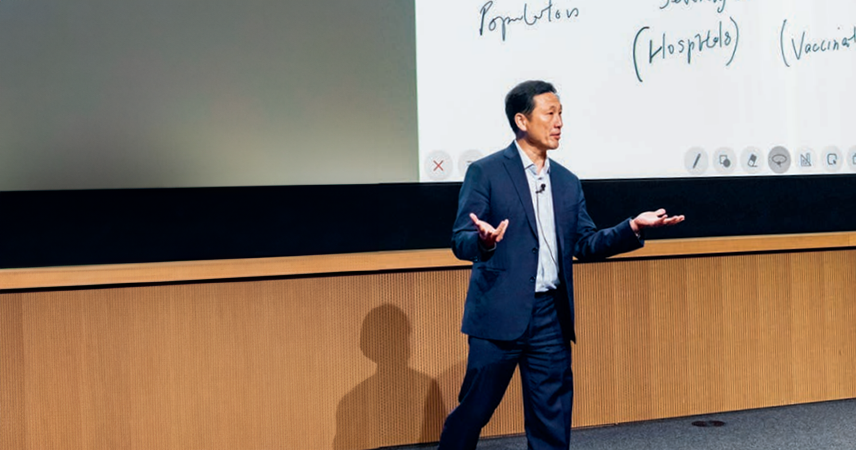
As the COVID-19 pandemic swept through the world’s population in 2020–21, some jurisdictions responded more effectively than others. A better
performing nation, registering just over 200 deaths per million population, compared with 2–3,000 in other nations, was Singapore, where the
Health Minister has been Ong Ye Kung, an IMD alumnus.
He notes that East Asian peoples reacted more cooperatively to measures such as quarantine, contact tracing, the wearing of masks and social distancing, because of the experience of the SARS epidemic in 2003. Yet there were measures that he took that also helped. In giving a talk at
the IMD campus in 2022, he described how he used an adaptation of the DuPont financial analysis – a long established technique for assessing company performance – to monitor the spread of COVID-19.
“I’ve learned to take a mathematical equation or calculation, break it down into components … In my own geeky way, I broke down the COVID death rate as a function of hospital capacity, transmissibility and vaccination rate.” There was a neat circularity in his giving a talk to business alumni on public health policy. Two decades earlier, as a young civil servant in Singapore, one of the motives for studying an MBA was for the public sector to understand business better.
“It is important for us to understand as regulators how the private sector and commercial motive works, and I think it requires a meeting of minds. That is especially important for an international commercial hub like Singapore.”
He found the MBA to be especially helpful in instilling the discipline of identifying the core problem to be addressed in a complex and fluid organizational context. There will always be multiple data points and presenting issues; a leader grasps the most important, and comes to a decision. “Then you just simply have to decide, explain, and you don’t fret about what you cannot control.”
After graduating in 1999 and returning to Singapore, he became a trade negotiator. He was able to draw on lessons from Professor James Wood at
IMD on “Getting to Yes” which were highly valuable, for example in trade negotiations with the USA.
He pays tribute to the rules-based system that gradually came to replace the colonial order for much of the global economy in the second half of the 20th century. It “allows a big country like the US, a superpower, and a tiny island state like us to negotiate as equals … I cannot imagine this happening before World War Two.”
“I broke down COVID death rate as a function of hospital capacity, transmissibility and vaccination rate.”
The Singapore Government has been able to deploy hidden benefits of being a small but advanced economy in securing trade deals: “Firstly we are a hub, so although our market is small, from Singapore you can do a lot more things with the region and the
world … Secondly is because we are small, we are never a threat to other countries, especially their sensitive sectors [such as] culture, agriculture, textiles … For many countries it is good to start with a nonthreatening partner like Singapore before they go for bigger fishes.”
In all negotiations, it is necessary to understand your own, and the other parties’, real interests. Exploiting another party’s weakness for maximum gain may lead to a short-term win, but it is unlikely to last. He explains:
“In the end, if you can find 80% or 70% win-win, that forms the bulk of the deal; for the remaining 20-30% you may have to give up some, your partner may have to give up some … So a good deal is often one where, at the end of it, none of the parties feel elated. They are both a little bit unhappy. That’s a sign of a good lasting deal.”
His commitment to public policy led him to stand for office, but in his first election he was unsuccessful. He used the opportunity to gain private sector experience, and was appointed strategy director for the industrial group Keppel in the early 2010s. At the time, it was a fairly diverse conglomerate, and he began the process of studying ways to curb the investor discount that most conglomerates attract, by studying the few diverse groups that trade at a premium. Since then the group has made some divestments, subsequent to his departure.
In 2015, he was elected as a Member of Parliament and was soon elevated to ministerial office, becoming successively Minister for Education, Second Minister for Defence and then Minister for Transport. He was re-elected in 2020, and became Health Minister in 2021.
He looks back on his year in Lausanne with affection, describing IMD as an “indelible part of who I am”. Indeed, it was life-changing in more ways than one, as he and his wife’s first child was conceived during the year, and born in January 2000.
“Life is a learning journey … [it is] full of ups and downs. Today I’m selected for this [50 alumni list], but two years later, I may lose an election. So, just embrace life and keep on learning. And IMD taught us how to do it in real life.”


